
7 Best Rollator Walkers for Seniors – Your Guide to Enhanced Mobility
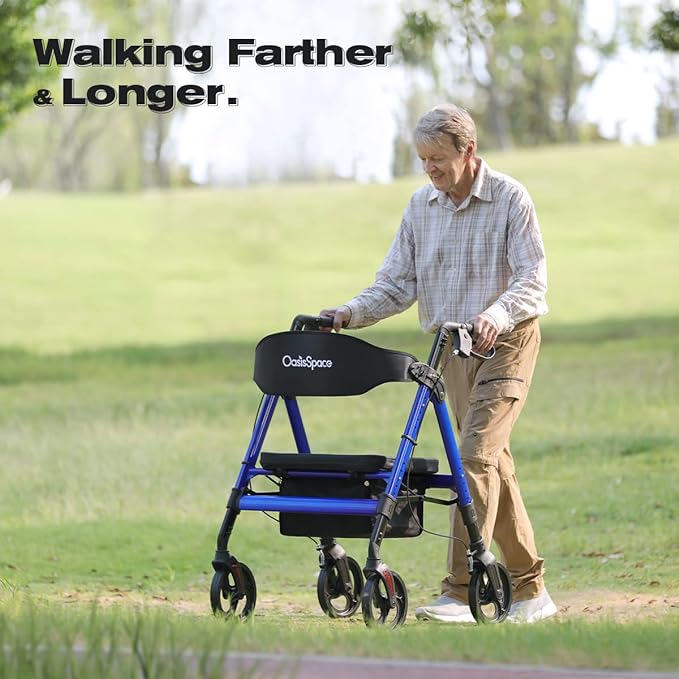
As we age, maintaining mobility and independence can become more challenging. Rollator walkers have emerged as a vital tool for seniors seeking safe and comfortable ways to stay active. In this review, we’ll explore the 7 best rollator walkers for seniors, focusing on their features, benefits, and suitability for different needs.
Tips for Choosing Rollator Walkers for Seniors
When selecting a rollator walker for seniors, it’s important to consider various factors to ensure safety, comfort, and usability. Here are key tips to guide you in making the best choice:
Understand the Different Types
- Standard Rollators: Usually have four wheels, a seat, and a storage basket.
- Three-Wheel Rollators: Offer better maneuverability in tight spaces but may lack a seat.
- Heavy-Duty Rollators: Designed for larger individuals, with a wider frame and higher weight capacity.
Check the Weight Capacity
- Ensure the rollator can safely support the user’s weight.
- Typical weight capacities range from 250 to 500 pounds.
Consider the Wheel Size
- Larger Wheels: Better for outdoor use and rough terrains.
- Smaller Wheels: Ideal for indoor use and smooth surfaces.
Look for Adjustable Height Features
- A rollator should match the user’s height for comfortable use.
- Handles should align with the wrists when the arms are at their sides.
Evaluate the Seat Comfort
- A padded seat is essential for rest breaks.
- Check the seat height and width for comfort and ease of sitting/standing.
Prioritize Safety Features
- Look for rollators with easy-to-use brakes for added safety.
- Reflectors or lights are useful for visibility if used outdoors.
Assess the Storage Options
- Consider models with built-in baskets or pouches for carrying personal items.
- Ensure the storage is easily accessible and secure.
Test Maneuverability and Foldability
- The rollator should be easy to maneuver around corners and tight spaces.
- A foldable design is crucial for storage and transport.
Inspect the Frame Material
- Aluminum Frames: Lightweight and easy to move.
- Steel Frames: More durable but heavier.
Factor in the Cost
- Rollator walkers vary in price based on features and quality.
- Higher-priced models often offer more features and durability.
Read Reviews and Seek Recommendations
- Look at customer reviews to gauge satisfaction and common issues.
- Seek recommendations from healthcare professionals or existing users.
Consider Future Needs
- Anticipate potential changes in mobility or health conditions.
- Choose a rollator that can adapt to evolving needs.
Check for Warranty and Customer Support
- A good warranty can provide peace of mind and protection against defects.
- Reliable customer support is crucial for addressing any issues.
Tips for Maintaining Rollator Walkers for Seniors
Proper maintenance of a rollator walker is essential to ensure its longevity and the safety of its user. Here are several tips to keep in mind:
Regular Cleaning
- Frame: Wipe down the frame regularly with a damp cloth to remove dirt and grime.
- Seat and Backrest: Clean with mild soap and water, especially if made of fabric.
- Handles: Disinfect handles frequently to prevent the spread of germs.
Wheel Maintenance
- Check the wheels for wear and tear. Replace them if they become worn out or damaged.
- Ensure wheels spin freely and don’t wobble.
- Clean the wheels to remove any debris that may hinder movement.
Brake Inspection
- Test the brakes regularly to ensure they engage properly and hold the rollator stationary.
- Adjust the brake tension if the brakes feel loose.
- Replace brake cables or grips if they show signs of wear.
Check for Loose Fasteners
- Periodically check and tighten any loose screws or bolts.
- Pay special attention to areas that undergo frequent movement or folding.
Lubricate Moving Parts
- Use a silicone-based lubricant on hinges and folding mechanisms to ensure smooth operation.
- Avoid oil-based lubricants, as they can attract dirt and dust.
Inspect the Seat
- Regularly check the seat for any signs of wear or tear.
- Ensure the seat is securely attached to the frame.
Storage Tips
- Store the rollator in a dry, clean place to avoid rust and corrosion.
- Avoid leaving it in extreme temperatures, which can damage materials.
Regularly Check the Adjustability
- Ensure height adjustment mechanisms work smoothly.
- Regularly adjust and test to match the user’s comfort.
Follow Manufacturer’s Guidelines
- Refer to the user manual for specific maintenance recommendations.
- Adhere to the manufacturer’s advice for replacement parts.
Professional Inspections
- Consider having the rollator inspected by a professional annually.
- This is especially important for heavily used or aging rollators.
Be Mindful of Weight Limits
- Regularly remind the user of the rollator’s weight capacity to avoid overloading.
- Overloading can lead to structural damage and safety risks.
Educate the User
- Teach the senior how to properly use and maintain the rollator.
- Awareness can prevent misuse, which often leads to wear and damage.
7 Best Rollator Walkers for Seniors
1. Drive Medical Nitro Euro Style Rollator Walker
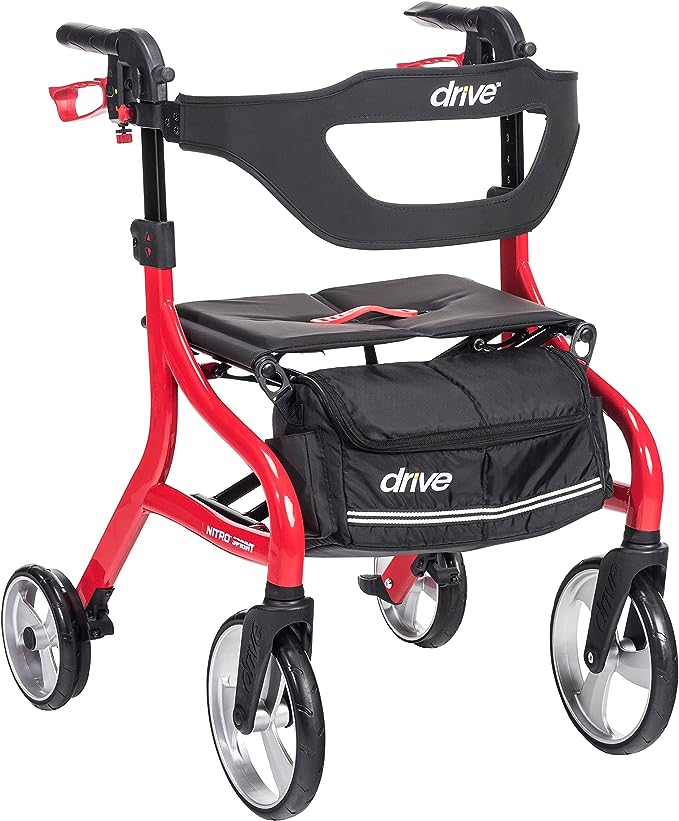
Price: $$$
Weight Capacity: 300 lbs
Key Feature: Stylish European design with large front wheels
The Drive Medical Nitro Euro Style Rollator Walker stands out with its sleek design and excellent maneuverability. It’s perfect for seniors who want a combination of style and functionality.
Important Note: This model is ideal for outdoor use, thanks to its large front wheels that handle various terrains smoothly.
Also Read:
2. Medline Premium Empower Rollator Walker
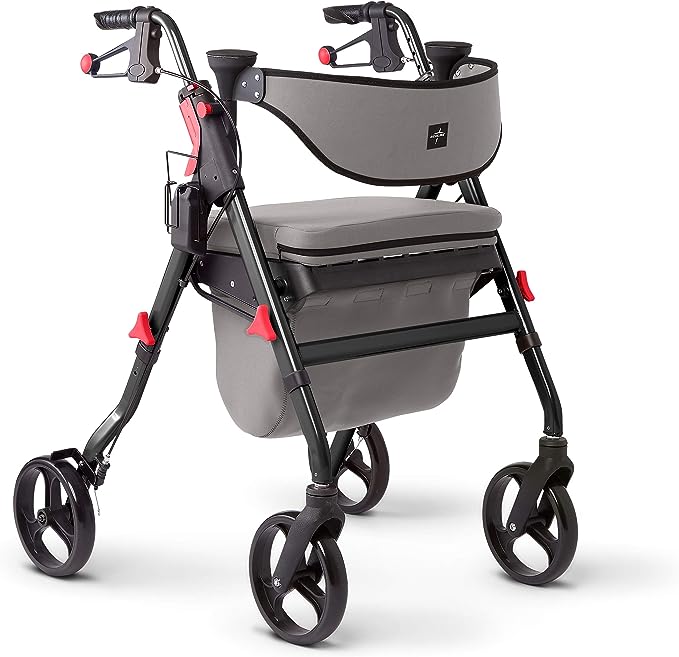
Price: $$$
Weight Capacity: 300 lbs
Key Feature: Extra-wide memory foam seat
Medline’s Empower Rollator Walker is a top choice for those valuing comfort. The extra-wide memory foam seat provides exceptional comfort, making it ideal for seniors who need frequent rest breaks.
3. Hugo Elite Rollator Walker with Seat
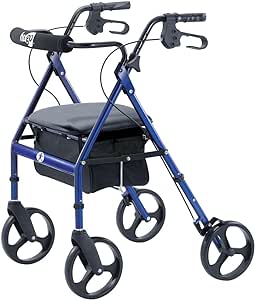
Price: $$
Weight Capacity: 300 lbs
Key Feature: Tool-free assembly
The Hugo Elite Rollator Walker is a practical and affordable option. Its easy, tool-free assembly is a significant plus for seniors who prefer a no-fuss setup.
4. OasisSpace Aluminum Rollator Walker

Price: $$
Weight Capacity: 300 lbs
Key Feature: Compact design for easy storage
OasisSpace’s Aluminum Rollator Walker is best for seniors with limited storage space. Its compact design does not compromise on stability or comfort.
5. NOVA Traveler 3 Wheel Rollator Walker

Price: $$
Weight Capacity: 250 lbs
Key Feature: Three-wheel design for tight spaces
The NOVA Traveler is unique with its three-wheel design, offering exceptional maneuverability in tight spaces. It’s a great option for seniors living in smaller apartments or homes.
6. ProBasics Transport Rollator Walker with Seat and Wheels
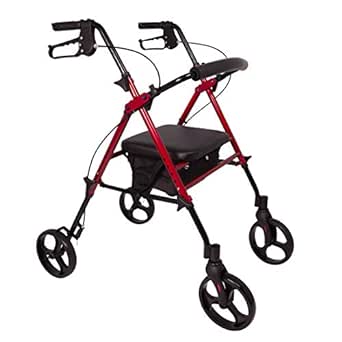
Price: $$$
Weight Capacity: 250 lbs
Key Feature: Doubles as a transport chair
The ProBasics Transport Rollator combines a walker and a transport chair, making it an excellent choice for seniors who may occasionally need to be pushed by a caregiver.
7. Healthline Elite Aluminum Rollator Walker

Price: $
Weight Capacity: 300 lbs
Key Feature: Budget-friendly without compromising quality
For seniors on a budget, the Healthline Elite Aluminum Rollator Walker offers a balance of quality and affordability. It’s a solid choice for everyday use.
Comparison Table
| Model | Price | Weight Capacity | Key Feature |
|---|---|---|---|
| Drive Medical Nitro | $$$ | 300 lbs | European design, large wheels |
| Medline Empower | $$$ | 300 lbs | Wide memory foam seat |
| Hugo Elite | $$ | 300 lbs | Tool-free assembly |
| OasisSpace Aluminum | $$ | 300 lbs | Compact design |
| NOVA Traveler 3 Wheel | $$ | 250 lbs | Three-wheel design |
| ProBasics Transport | $$$ | 250 lbs | Dual walker/transport chair |
| Healthline Elite | $ | 300 lbs | Budget-friendly |
Conclusion
Choosing the right rollator walker involves considering factors like weight capacity, ease of use, comfort, and budget. The seven options listed above cater to a wide range of needs and preferences, ensuring that there’s a suitable choice for every senior looking to maintain their mobility and independence.
Remember, it’s essential to consult with a healthcare professional before making a purchase to ensure the rollator walker fits your specific health and mobility requirements.
Frequently Asked Questions About Rollator Walkers for Seniors
Rollator walkers are a popular mobility aid for seniors, and it’s natural to have questions about them. Below are some of the most commonly asked questions and their answers:
What is a Rollator Walker?
- A rollator walker is a walking aid designed for individuals who need additional support for balance and mobility. It typically has a frame with three or four wheels, handlebars, a seat, and brakes.
How is a Rollator Different from a Standard Walker?
- Unlike standard walkers, rollators have wheels on all legs and do not require lifting to move forward. They often come with a seat for resting and additional features like storage baskets.
What Should I Look for When Choosing a Rollator Walker?
- Consider factors like weight capacity, wheel size, height adjustability, brake type, seat comfort, and foldability. The choice depends on the user’s physical needs, lifestyle, and where the rollator will be used (indoors or outdoors).
Are Rollator Walkers Safe for Seniors to Use?
- Yes, when used correctly, rollator walkers are safe for seniors. They provide additional stability and can reduce the risk of falls. However, it’s crucial to choose the right type and ensure it’s properly adjusted for the user.
Can a Rollator Walker be Used on All Types of Surfaces?
- Rollators with larger wheels are better suited for outdoor use and uneven surfaces. Models with smaller wheels are typically designed for indoor use on flat, smooth surfaces.
How Do I Maintain a Rollator Walker?
- Regular maintenance includes cleaning, checking the brakes, inspecting the wheels, and ensuring all parts are securely fastened. Refer to the manufacturer’s guidelines for specific maintenance instructions.
Is it Difficult to Transport a Rollator Walker?
- Many rollator walkers are designed to be foldable for easy transport and storage. However, the weight and size of the rollator should be considered when planning to transport it in a vehicle.
How Do I Adjust a Rollator Walker to the Correct Height?
- The handles of the rollator should be at the level of the user’s wrists when they stand upright. Most rollators have adjustable handles to accommodate different heights.
Can Rollator Walkers be Used for Sitting?
- Yes, most rollator walkers come with a built-in seat, which is useful for taking short breaks. However, it’s important to ensure the rollator is stationary and the brakes are engaged before sitting.
Are There Accessories Available for Rollator Walkers?
- Yes, there are various accessories available, such as cup holders, trays, additional storage bags, and more. These can enhance the functionality and convenience of the rollator.
How Long Does a Rollator Walker Last?
- The lifespan of a rollator walker depends on its quality, frequency of use, and how well it is maintained. Regular maintenance can significantly extend its life.
Where Can I Purchase a Rollator Walker?
- Rollator walkers can be purchased from medical supply stores, some pharmacies, and online retailers. It’s advisable to try several models before making a purchase to find the best fit.






